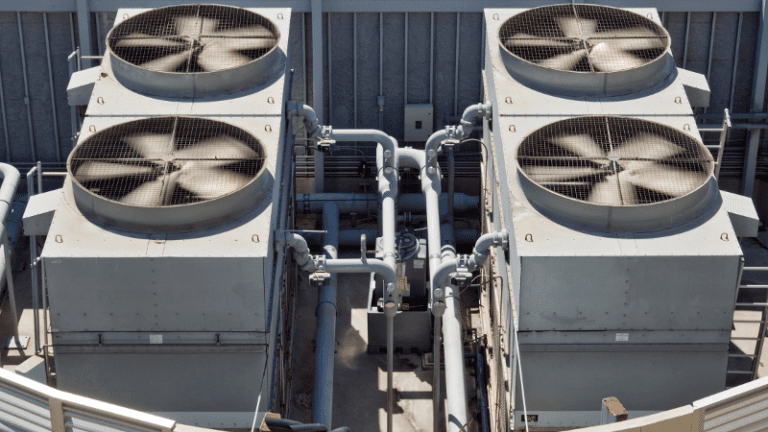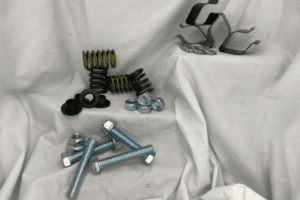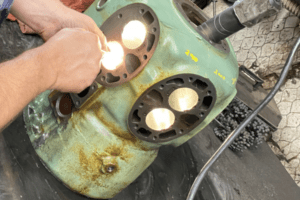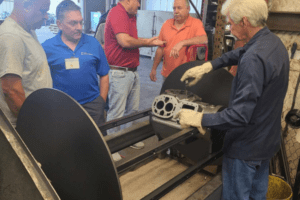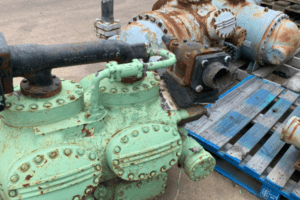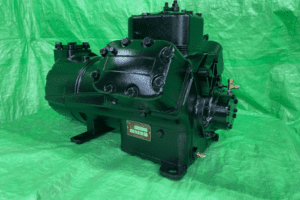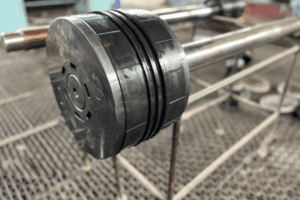Lightning is one of the biggest risk factors that can damage your building systems. The effects are profound no matter where you are, but they can be even worse in areas known for poor-quality utility service. Commercial compressors can be damaged during lightning storms even if you don’t sustain a direct hit.
Lightning Storms Are a Danger to Your Commercial HVAC Compressor
Can lightning strike your HVAC compressor? The simple answer is “yes.”
During a storm, the electronic components of your HVAC system make for easy targets. These components work together with wire coils to generate power and mechanical parts to keep your HVAC system humming.
Ideally, you should use your thermostat to shut down your HVAC system during a storm. While this doesn’t totally eliminate the risk of damage, it will minimize the impact. When the compressor is fully shut down, it doesn’t carry voltage that can seriously damage the compressor (and adjacent components) during a lightning strike.
Be advised that there are other potential hazards related to lightning. During a storm, your area may be experiencing spikes and sags of voltage that happen even if lights and all other systems seem functional.
Turning your HVAC compressor off is the solution to this problem as well. However, if you’re in an environment where you can’t turn off your compressor, there are some alternatives. An Uninterruptible Power Supply (UPS) with line conditioning will prevent dips and spikes from harming sensitive equipment directly connected to it.
One way to reduce the overall risk is to equip your building with lightning strike mitigation. A standard lightning rod, if installed correctly, will divert the great majority of strikes. Although this may cost a few thousand dollars initially, it’s a vast improvement over the tens of thousands in repair costs that could accrue to your commercial HVAC.
What Happens When Lightning Strikes a Commercial HVAC Compressor?
How much power does a lightning strike have?
More than your commercial HVAC compressor can handle, that much is for sure.
Experts have estimated that the average lightning strike generates about 1 billion joules of energy. Let’s look at that in a different way. One calorie in the food you eat equals 4.18 joules. If you could eat the equivalent of a jolt of lightning, it would be 239 million calories – more than the average person needs in 327 years.
When a lightning strike happens, the damage extends well beyond your compressor.
In addition to the compressor damage, you can also expect widespread damage to wiring and capacitors. Surge protector equipment can’t defend the compressor on its own, but may help to contain some of the widespread electrical damage that would otherwise be found throughout your structure.
After a lightning storm, it’s a wise idea to inspect the compressor and the surrounding area for signs of burning and charring. Document the damage as soon as possible so you have more opportunity to cover the repairs by using your insurance. Take photos of the damage and call your insurance company right away.
Waiting even as little as a day or two could cost you!
Can You Protect Your HVAC System from Lightning?
While there are some ways to moderate your building’s risk of a lightning strike, the HVAC compressor itself stays vulnerable unless it is turned off. When not in use, the lack of electrical current means the compressor becomes a much less likely target for a lightning strike.
Because a commercial HVAC system may be installed at the top of a tall business, it is already at substantial risk. As a general rule, items that are higher up are more vulnerable to lighting than those lower down. That’s part of why it is so crucial to make sure you never take shelter from a storm under a tall tree!
Other electrical issues throughout your building can worsen the problems your commercial HVAC compressor might have after a storm. With that in mind, it’s helpful to have your electrical system reviewed by a professional on an annual basis. Electricians can spot corroded or damaged wires and “hot” junctions.
They may be able to identify issues using infrared cameras while they are still relatively easy to fix.
Buying a Replacement Commercial HVAC Compressor After a Lightning Strike
A remanufactured commercial compressor is your best bet for a high-quality compressor replacement. While it may not be possible to use your existing compressor core for the unit, Compressors Unlimited sources vetted compressor cores from hundreds of different makes and models of compressors.
Even if your commercial compressor is still working after a lightning strike, it has usually lost efficiency. It will cost more to operate and be more prone to serious errors. With a remanufactured commercial compressor, you’ll source a trustworthy replacement in a matter of weeks, usually at a deep discount.

